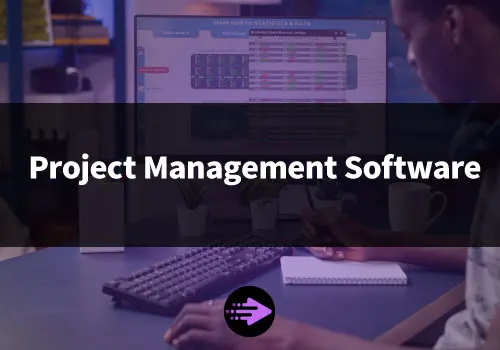Project management software for development helps software development teams stay organized, track progress, manage resources, collaborate effectively, and deliver projects on time and on budget. It provides tools to define tasks, assign team members, establish deadlines, track bugs and issues, manage documents, and give stakeholders visibility into the project’s status. This type of software automates many manual processes involved in software development projects, improving efficiency and reducing human error.
Project management software allows you to plan, organize, and manage software development projects efficiently. It helps developers and project managers:
- Communicate effectively across the development team and with stakeholders
- Plan projects through task and resource management
- Automate workflows through integrations
- Track time spent on tasks
- Manage bugs and issues
- Collaborate in real time by sharing tasks, files, notes, and more
- Gain insights through dashboards and reports
All of this enables software development teams to ship code faster, optimize resource allocation, and have greater project visibility, ultimately helping to deliver working software on schedule and within budget.

Types Of Project Management Software For Development
Traditional Project Management Tools
Traditional project management tools like MS Project and Excel spreadsheets have been around for decades. While they offer basic features like task management, resource allocation, and Gantt charts, they lack some important capabilities needed for agile software development:
- Limited customization
- Difficulty adapting to changes
- Less real-time collaboration
- Lack of integration with code repositories and IDEs
Agile Project Management Tools
Agile project management software for development are designed specifically for software development teams using agile methodologies. They offer features like:
- Kanban boards
- Backlog management
- Sprints
- Burndown charts
- Integrations with source code management systems
- Real-time collaboration and communication tools
Some examples of agile project management tools are Doitify, Asana, and Monday.com. They allow for more flexibility, transparency, and collaboration that is critical for fast-paced software development workflows.
We have been written about Project Management Software Benefits in another article.
Project Management Tool In Software Engineering
Choosing The Right Tool For Your Projects
When choosing a project management tool for your software development projects, consider:
- Your development methodology – Agile tools are best suited for agile development while traditional tools work for waterfall. Choose a tool that fits your process.
- Team size – Some tools only scale well for small to mid-sized teams while others can accommodate larger enterprises.
- Billing structure – Consider if you need a free, open-source, or paid tool.
- Level of customization – Some tools offer more flexibility to modify workflows and add features while others are more rigid.
- Integrations – Look for tools that easily integrate with your existing code repositories, IDEs, chat apps, and other products your team uses.
- Security, support and uptime – Ensure the tool has measures to keep your data secure, and offers reliable customer support and system uptime.
- Ease of use – Prefer tools that have intuitive interfaces and short learning curves.
Evaluate tools based on these factors, try their free trials and consult your team members to determine which solution will work best for managing your development processes.
We have been written about Project Management Tool For Teams in another article.

Project Management Software For Development Key Features
When evaluating project management tools for software development, look for:
Key Features Of Project Management Tools for Software Developers
Choosing The Right Tool For Your Projects
Project Management Software For Development Key Features
- Customization options – Ability to customize workflows, fields, forms, statuses, and permissions to match your specific needs. This ensures the tool fits your development processes.
- Reporting and dashboards – Easy-to-use reporting and visualization of project data through charts, graphs and dashboards. This provides key insights and helps make data-driven decisions.
- Integration with other tools – Integrations with tools your team already uses like Git, JIRA, Slack, GSuite and more. This eliminates switching between multiple platforms.
- Kanban boards and backlogs – Kanban boards to visualize tasks and backlogs to organize and prioritize work items. These help teams follow agile methodologies.
- Issue and bug tracking – Robust issue tracking functionality to document, analyze and resolve software flaws and enhancements. This improves software quality.
- Time tracking – Accurate time tracking of time spent on tasks to optimize resource allocation and utilization.
- Gantt charts – Optional Gantt charts for traditional project planning and scheduling.
- Real-time collaboration – Features that enable real-time collaboration like comments, @mentions and file sharing. This improves team communication and productivity.
These features, when present in a project management tool, can significantly improve the efficiency of your software development processes.
Customization Options
Good project management tools for software developers allow for easy customization so you can modify fields, workflows, statuses, and permissions to match your specific development processes. This may include:
- Adding or removing custom fields to track additional details about tasks, issues, etc.
- Creating custom workflows and statuses to model your unique development lifecycles. For example, “analysis”, “in progress”, “testing”, “complete”.
- Setting different permission levels for team members to restrict access and visibility as needed.
- Customizing notifications and reminders so team members only receive relevant alerts.
- Adding plugins, scripts and integrations to extend the tool’s functionality.
The ability to customize the tool ensures it can precisely accommodate your development methodologies and team structures. Look for tools that offer ample customization options without requiring technical expertise.
We have been written about Free Project Management Tools in another article.
Reporting And Dashboards
Robust reporting and visualization features are essential for any project management tool. Good reports and dashboards in these tools:
- Provide real-time insights into project status and risks.
- Present data in an intuitive and easy-to-understand format using tables, charts and graphs.
- Allow drilling down into specific data to gain more granular insights.
- Highlight metrics that matter like task completion rates, time spent per member, open issues, etc.
- Allow custom reports to be created to track what’s important for your project.
These features help project managers and team leads make data-driven decisions quickly based on an accurate and current picture of the project’s health. Some examples of useful reports are:
- Burndown charts – Visualize work completed over time against estimated work remaining
- Timeline reports – Track progress against project milestones and deliverables
- Resource allocation reports – Monitor how team members’ time is utilized
- Issue tracking reports – Analyze trends in issues and bugs over time
Look for tools that offer a wide range of standardized and customizable reports for optimal visibility into your projects.
Integration With Other Tools
Integrating the project management tool with other software your team uses is essential to avoid context-switching and increase productivity. Integrations allow data and tasks to flow between tools automatically. Useful integrations for software developers include:
- Source code repositories – Like GitHub, Bitbucket, GitLab. This allows tasks and issues to be linked to commits and pull requests.
- Chat apps – Like Slack, Microsoft Teams. Tasks and updates can be posted directly into channels for immediate visibility.
- IDEs – Like Visual Studio Code, IntelliJ. Updates can be pushed from the IDE to the project management tool.
- GSuite tools – Like Gmail, Google Drive, Google Calendar. Files and events can be accessed directly within the tool.
- Project management tools – Like JIRA, Asana. This allows data to be shared between tools for large enterprises.
Look for a project management tool that integrates well with most or all of the applications your development team uses everyday. Native integrations are best, but Zapier, IFTTT and other automation tools can be used to connect disparate products.
The more integrations available, the less time your team will spend copying data between tools. This ultimately results in higher productivity and less errors.
We have been written about Simple Project Management Tool in another article.
Best Project Management Software For Development
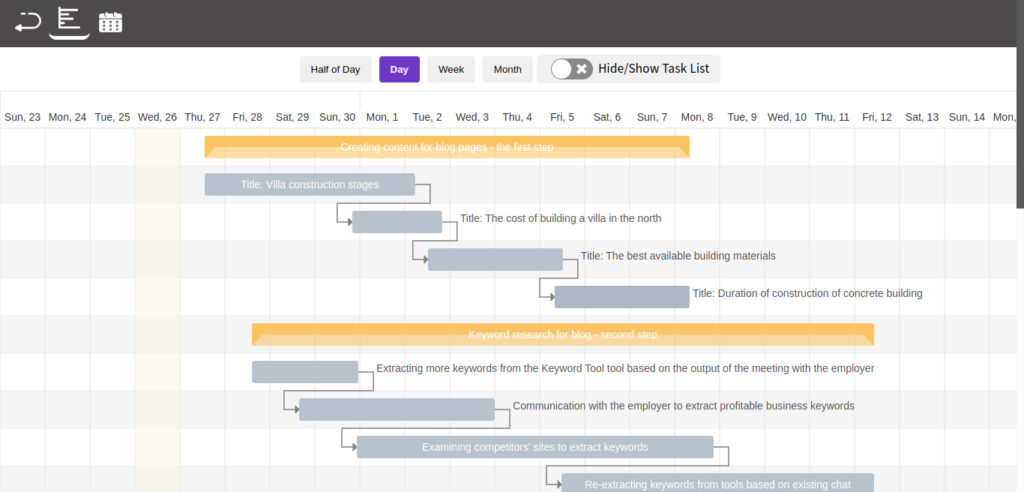
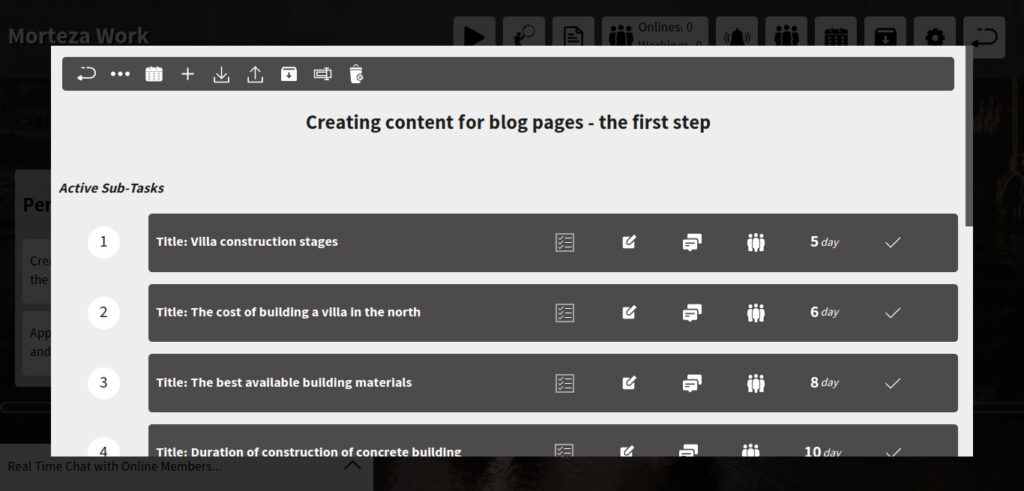
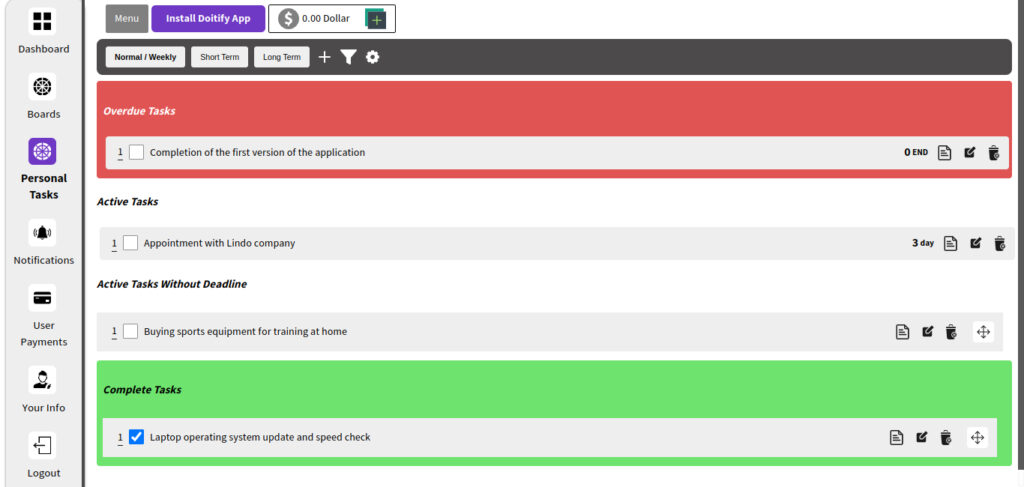

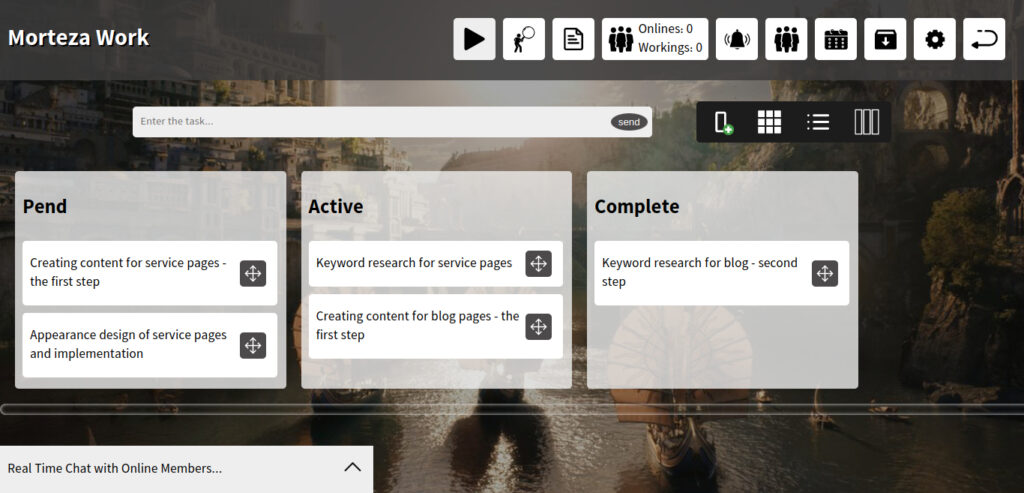
Doitify
Doitify is a project management software that helps teams stay organized and on track. It features a variety of tools to help with task management, collaboration, and communication.
Doitify is a good choice for project management software for development because it offers a number of features that are specifically designed to help developers stay organized and productive. These features include:
- A Kanban board for visualizing and managing tasks
- A Gantt chart for planning and tracking projects
- A task list for keeping track of all your tasks
- A calendar for scheduling events and meetings
- A chat feature for real-time collaboration
- A file sharing feature for sharing documents and assets
Doitify is also a very affordable option, especially for small businesses and startups. The free plan is perfect for teams of up to 5 users, and the paid plans start at just $10/month.
Best For: Doitify is best for small to Large-sized businesses and remote teams. It is a cloud-based software that can be accessed from anywhere with an internet connection.
Platforms: as Web app for all platforms.
Doitify Pricing
- Free plan: The free plan includes all features, but is limited to 5 members and 5 MB of space.
- Premium plan: The premium plan costs $0.50 per month per member and includes unlimited space.
Doitify Features
- Kanban board for visualizing and managing tasks
- Gantt chart for planning and tracking projects
- Task list for keeping track of all your tasks
- Calendar for scheduling events and meetings
- Chat feature for real-time collaboration
- File sharing feature for sharing documents and assets
Doitify Advantages
- Global Quality: The ability to compete with the best foreign project management software.
- Free Plan: All features of the software are free, with the option to pay for additional storage and users.
- Remote Team Management: The ability to communicate and monitor the performance of remote employees.
- Different Management Systems: Support for Agile, Scrum, and other management systems.
- Online Time Tracking: The ability to track and save the online time of employees.
- Screen Sharing: The ability for admins to view the screens of working employees.
- Daily Work Reports: Daily reports of employee work for better team and project control.
- User Performance Tracking: The ability to track user performance in specific time periods.
- Advanced Subtasks: The ability to create advanced subtasks with start and end times.
- Quality Control: Consideration of quality control managers for subtasks.
- Dedicated Chat: Chat capabilities for each subtask.
- User Roles: The ability to assign roles and rules for users.
- Checklists: The ability to create checklists for each task and subtask.
- Subtask Status: The ability to set statuses for each subtask.
- Import/Export: The ability to import and export subtasks.
- Gantt Chart and Calendar: The inclusion of a Gantt chart and calendar in the free version.
- Language Support: Support for right-to-left languages such as Chinese.
- Regular Updates: Regular updates to add new features and improve functionality.
- Pricing: Fair prices and the ability to create a portal for dollar currencies.
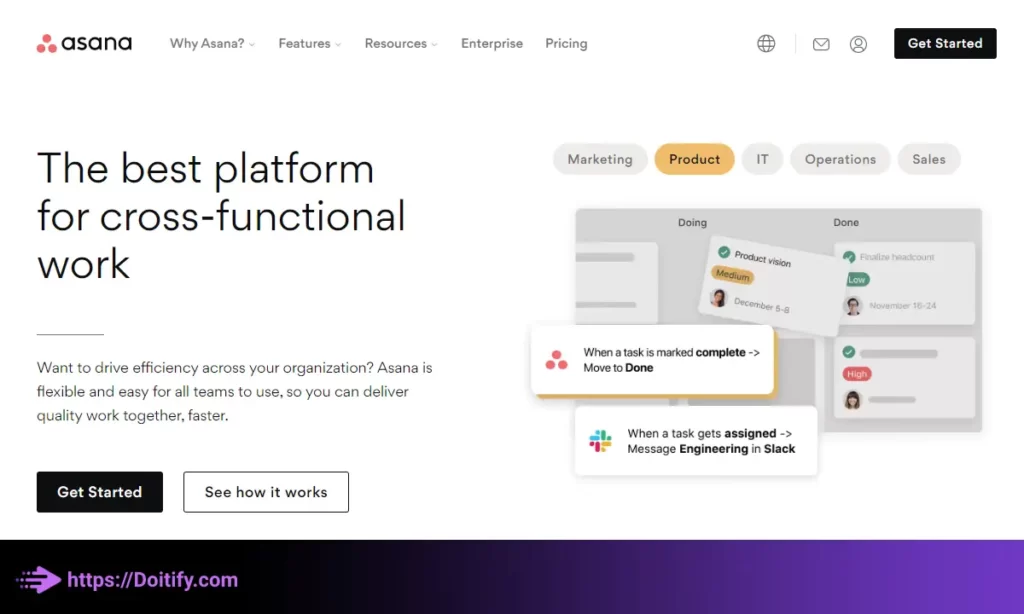
Asana
Asana provides work management features that help medium and large software development teams stay organized and efficient, powering effective project management software for development. The tool has customized workflows, powerful dashboards and reporting features that provide greater visibility into project status. It also offers mobile apps and advanced permission controls to build project management software for development at scale.
Some key capabilities that make Asana effective for software teams are:
- Custom “spaces” that act as projects or teams
- Kanban-style boards for visualizing work
- Flexible workflows tailored to your process
- Time tracking at the task or project level
- Analytics and reporting to gain insights
- Advanced security and member management
Asana shines for transparency and real-time collaboration, making it a good fit for software teams seeking an intuitive but versatile platform. The free Basic plan also makes Asana an accessible option for resource-constrained startups and small businesses.
In summary, Asana’s many customizable features, integrations and mobile apps help power efficient development workflows for medium to large software teams looking to optimize processes, resources and productivity through robust project management software for development.
Best For: Medium to large software teams wanting a robust and customizable tool
Platforms: Web app with mobile apps for iOS and Android devices
Asana Pricing
Starts at $9.99 per user per month for Professional plan
Asana Features
- Custom workflows and board configurations
- Gantt charts and calendar view
- Robust reporting and analytics
- Advanced permissions and tenant isolation
- Integrations with over 150 tools
- Mobile apps for iOS and Android
Asana shines for transparency and real-time collaboration, making it a good fit for software teams seeking an intuitive but versatile platform.
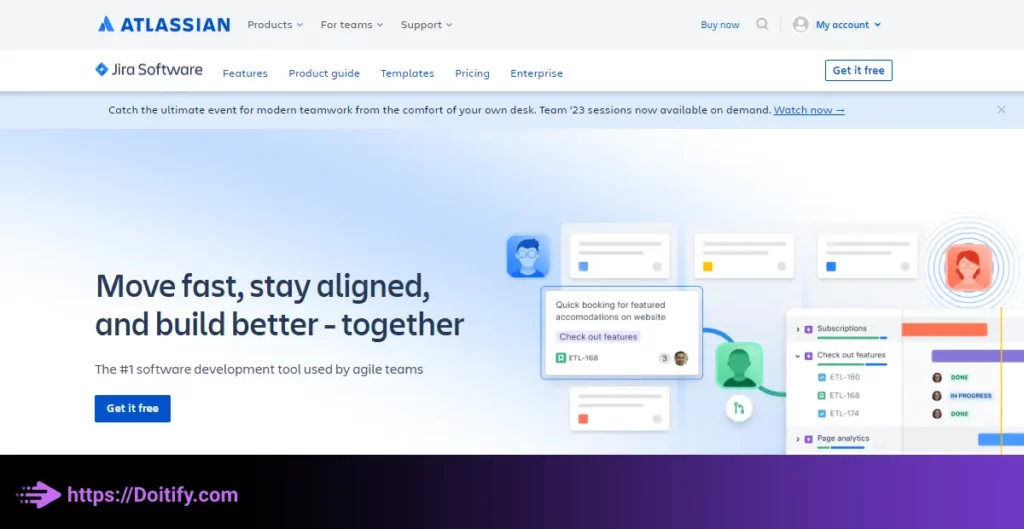
Jira
Jira Software is an enterprise-grade project management software for development with advanced capabilities suited for high-volume development. It offers integrations with Confluence and other Atlassian products to cover all aspects of software development.
Jira’s robust features help build efficient processes to create high quality project management software for development in large organizations. The tool provides:
- Customizable workflows and boards
- Granular permissions and security
- Issue and risk management tracking
- Reporting and analytics
- Advanced integrations
Though Jira has a steeper learning curve and higher costs, it offers functionality and customization required by large enterprises. This makes it the go-to tool for managing software projects at scale across teams and locations.
Best For: Large enterprises wanting a fully feature-rich tool
Platforms: Web app with mobile apps for iOS and Android devices
Jira Pricing
Starts at $10 per user per month
Jira Features
- Flexible workflows to model any process
- Fine-grained permissions
- Over 100 default reports and dashboards
- Integrates with over 500 tools
- Security and compliance features
- Enterprise-grade support
Jira’s extensive feature set makes it extremely valuable for managing the complexity of product development in large organizations.
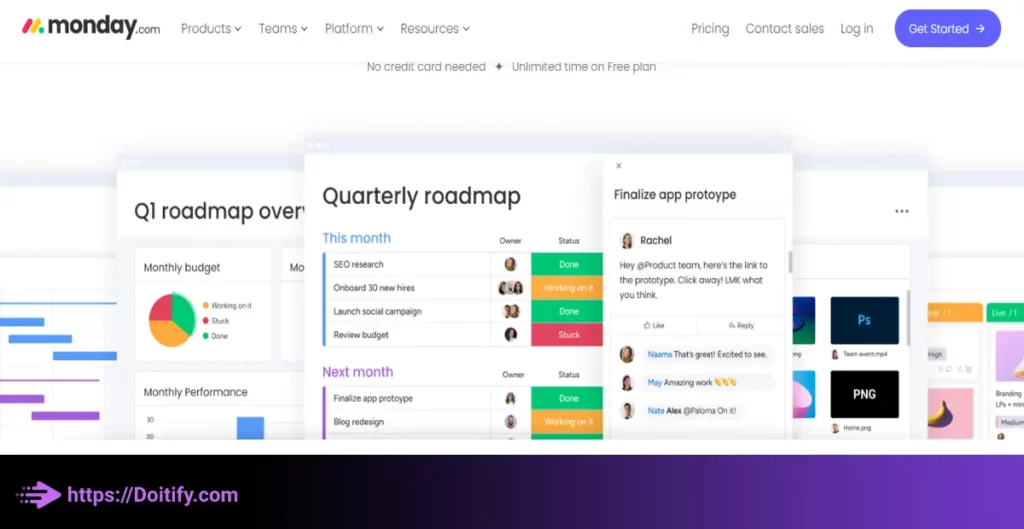
Monday.com
Monday.com offers both kanban boards and Gantt charts, giving mid-sized and large software development teams the flexibility to manage work in whatever way suits them best. The tool is known for its excellent reporting and time-tracking capabilities that provide valuable insights to build efficient project management software for development.
Monday.com provides features like:
- Customized workflows and views
- Real-time collaboration
- Advanced reporting and over 50 dashboards
- Time tracking down to the minute
- Integrations with over 800 tools
Monday.com shines for companies requiring deep visibility into project performance to optimize processes, resource allocation and overall efficiency. The tool streamlines management of complex product development initiatives at scale.
Best For: Mid-sized to large teams requiring a robust feature set
Platforms: Web app with mobile apps for iOS and Android devices
Monday.com Pricing
Starts at $8 per user per month for Basic plan
Monday.com Features
- Customizable templates and workflows
- Timesheets with utilization metrics
- Automation of routine tasks
- Integrations with development tools, CRMs and more
- Cost tracking across projects
- Mobile apps for access on the go
Monday.com is best suited for mid-sized and enterprise software teams that need a holistic management solution with in-depth reporting and robust capabilities.
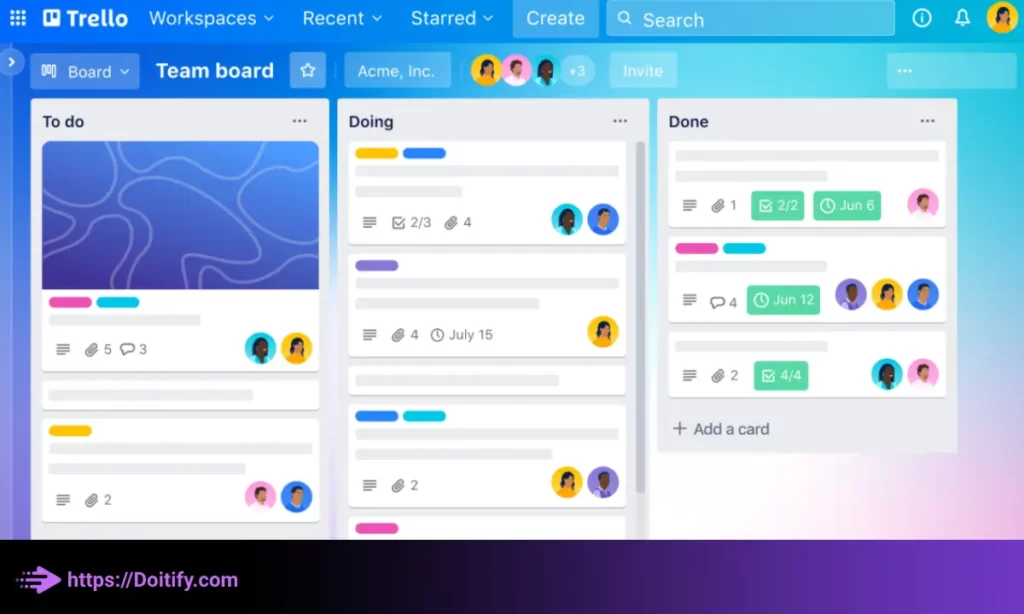
Trello
Trello is a flexible, intuitive and free kanban-focused project management software for development ideal for small software development teams. The simple drag-and-drop interface keeps teams organized while allowing customization through “power-ups” and integrations to build project management software for development that fits their workflows.
Best For: Small teams seeking a simple but flexible kanban solution
Platforms: Web app with mobile apps for iOS and Android devices
Trello Pricing
Free Basic plan with upgrades available
Trello Features
- Custom kanban boards for each project
- List and card templates for consistency
- Ability to assign due dates and add checklists
- File uploading and commenting
- Integrations with over 200 tools via Zapier
Though lacking advanced features like Gantt charts and robust reporting, Trello shines for small software teams that value:
- Simplicity – The interface is intuitive and easy to learn
- Flexibility – Custom “power-ups” add dozens of capabilities
- Free plan – Trello Blue is always no-cost
- Mobility – Native mobile apps are available
In summary, Trello is best suited for small, nimble teams that need a simple but customizable kanban tool to organize and visualize work – without project management software for development becoming overwhelming or expensive.
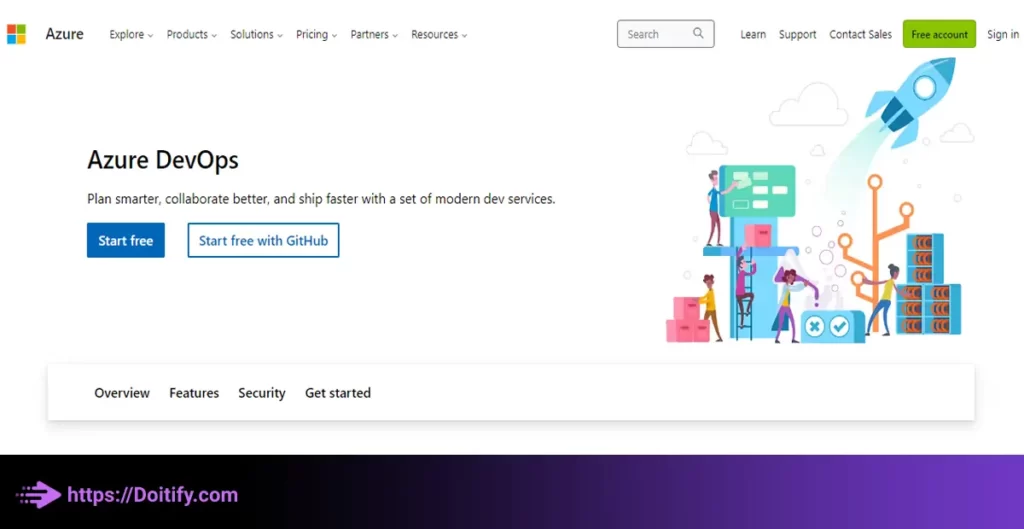
Azure DevOps
Azure DevOps (formerly known as Visual Studio Team Services) is Microsoft’s project management platform built specifically for software teams. It comprises capabilities for agile planning, source control, reporting and industry-leading CI/CD – providing an integrated solution to manage entire product development cycles.
Best For: Microsoft-centric shops and large enterprises
Platforms: Web interface
Azure DevOps Pricing
Free for up to 5 users, then $6-$18 per user per month
Azure DevOps Features
Key features that help Azure DevOps build effective project management software for development include:
- Agile tooling like boards, backlogs and burndowns
- Integrated source control via Azure Repos
- Over 100 built-in dashboards and reports
- Sophisticated continuous integration and delivery
- Deep Visual Studio integration for developers
- Role-based security and access controls
Azure DevOps is best suited for:
- Microsoft-centric organizations that use Visual Studio, .NET and other Azure products
- Large enterprises seeking an integrated ALM solution covering the entire development lifecycle, from planning to deployment
- Teams needing advanced CI/CD pipelines to automate the software delivery process
Though not as intuitive or mature as dedicated agile tools, Azure DevOps offers a robust feature set along with the advantages of a tightly integrated Microsoft product. For the right teams, it can provide a comprehensive environment for managing complex software development projects.
We have been written about Project Management Tool With Gantt Chart in another article.
Conclusion
In summary, project management software can be invaluable for software development teams, helping them plan, organize, track and collaborate more effectively. There are many options available, from agile-focused tools to fully integrated ALM platforms. Choosing the right solution depends on factors like your team size, development methodology, desired features, pricing and existing tech stack.
While no tool will be a perfect fit for every need, project management software in general can help software teams reduce chaos, remain organized, optimize resource allocation and improve visibility – ultimately shipping code and delivering value to customers more quickly and reliably. Integrating such a solution into your development processes should be a high priority for any organization seeking to maximize efficiency, productivity and software quality.
FAQs
How does project management software benefit software development?
• Improved efficiency – Automating manual processes through a project management software for development saves time and improves productivity for development teams.
• Better resource optimization – Features like resource allocation, time tracking and reporting help match the right resources to the right tasks and identify bottlenecks.
• Increased visibility – Dashboards and reports give stakeholders visibility into project status, risks and progress, improving accountability.
• Reduced errors – Issues can be documented and tracked, helping teams resolve bugs and flaws earlier in the development cycle.
What are some disadvantages of project management tools?
• Learning curve – Project management software often has a steep learning curve, especially more robust tools. This wastes initial time during adoption.
• Distractions – Constant notifications and alerts can distract developers from actual coding work.
• Cost – Many tools require paid subscriptions which add to operating expenses.
• Reliance – Teams become too reliant on the software instead of people and processes.
Complexity – Some tools become too complex, requiring administrators to manage the system.
What is the difference between project management and task management?
Project management involves high-level planning and coordination to achieve objectives within constraints like scope, time, and cost.
Task management focuses on tracking and executing individual tasks or activities that contribute to completion of projects.
While related, they place emphasis on different levels of granularity and outcomes.
How do you improve project management processes without software?
• Define clear goals, dependencies and constraints
• Establish roles and responsibilities
• Implement standard project documentation
• Enforce communication protocols
• Adopt an effective development methodology
• Conduct routine status meetings
• Track tasks and work estimates accurately
• Review progress systematically
• Learn from issues and continually improve processes
